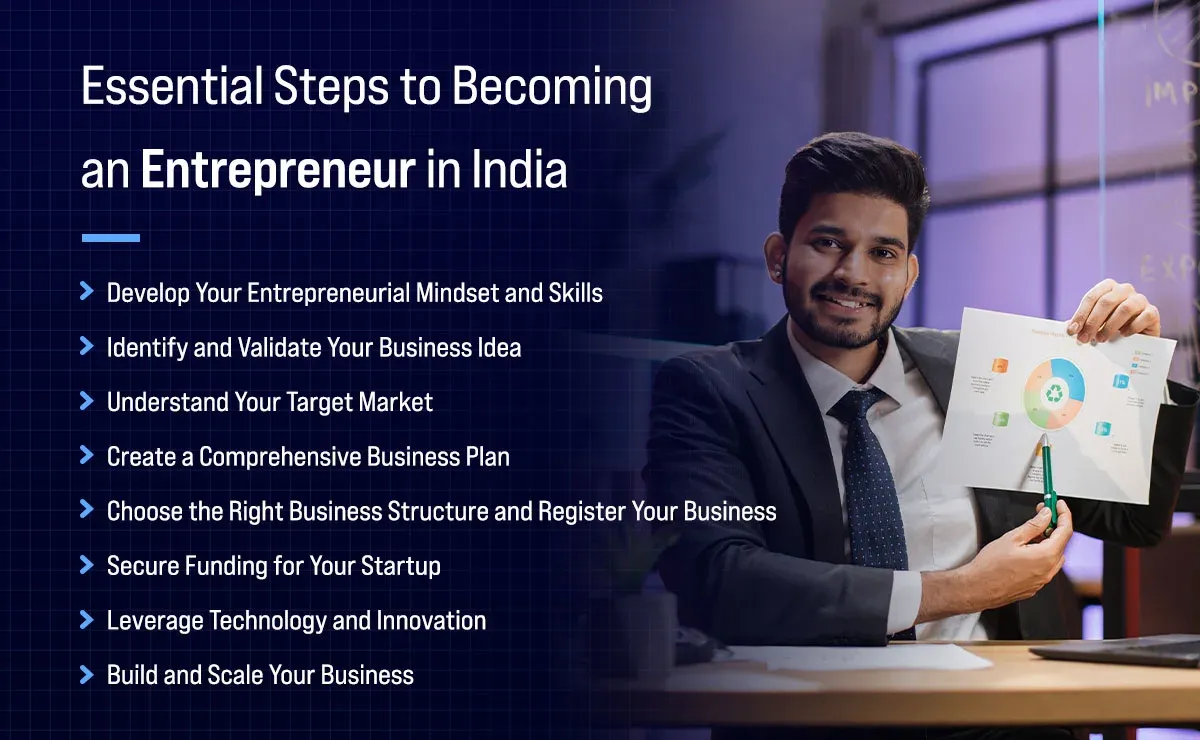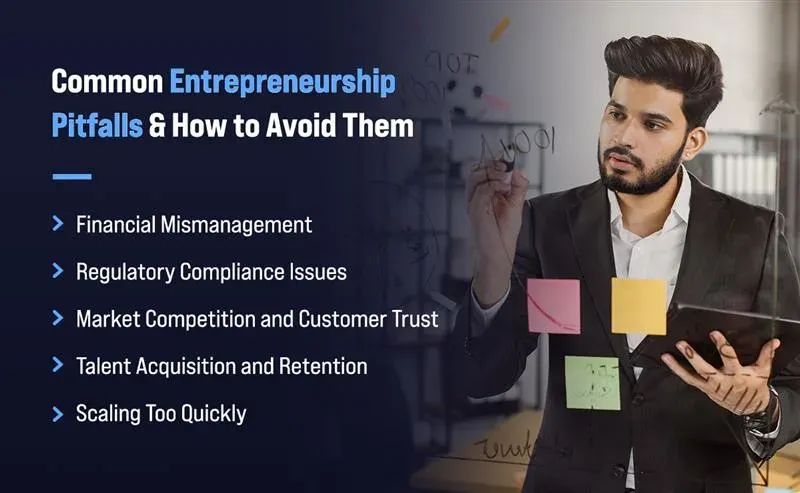How to Become an Entrepreneur?

India stands as the world’s third-largest startup hub, housing over 159,000 registered startups and more than 100 unicorn companies. The entrepreneurial landscape has undergone a remarkable transformation, creating over 17.28 lakh jobs and witnessing a significant shift toward innovation-driven businesses. With 51% of startups now emerging from Tier II and III cities, entrepreneurship in India has become more democratized and accessible than ever before.
Nonetheless, transforming a brilliant idea into a thriving entrepreneurial venture involves much more. It demands strategic planning, the right skills, access to funding, and an understanding of the complex business landscape. This article provides aspiring entrepreneurs with a roadmap to navigate India's dynamic startup ecosystem in 2025.
Essential Steps to Becoming an Entrepreneur in India

1. Develop Your Entrepreneurial Mindset and Skills
The foundation of successful entrepreneurship lies in cultivating the right mindset and acquiring essential skills. Research shows that passion for the industry (60%) and identification of market gaps (40%) are the primary motivations for launching ventures in India.
Core Entrepreneurial Skills You Must Develop:
- Leadership and Vision: Successful entrepreneurs exemplify visionary thinking by anticipating future market needs. Effective leadership empowers you to motivate teams, make strategic decisions, and confidently tackle challenges.
- Financial Literacy: Understanding cash flow management, investment analysis, and financial planning is crucial. Many startups fail due to poor financial management, making this skill non-negotiable for entrepreneurs.
- Digital Marketing and Sales: In today's digital-first economy, entrepreneurs must master online marketing, social media strategies, and customer acquisition techniques.
- Problem-Solving and Adaptability: A crucial skill is the capacity to adjust and evolve when facing unforeseen challenges. Examples like Ritesh Agarwal of OYO, who successfully pivoted from its core business model to focus on long-stay rentals, sanitization protocols, and digital transformation during COVID-19, demonstrate the importance of adaptability.
- Networking Skills: Developing strong networks with investors, advisors, clients, and industry contacts unlocks valuable opportunities and collaborations.
2. Identify and Validate Your Business Idea
Before diving into any business venture, conduct thorough market research to identify some of the most genuine problems that your potential customers are facing and then validate your market demand.
Steps for Validating Your Idea:
- Conduct surveys and interviews with potential customers.
- Create a minimum viable product (MVP) to test market response.
- Analyze competitor landscapes and identify market gaps.
- Take advantage of platforms like Google Trends and social media tools to evaluate market interest.
Focus on Problem-Solving: The most successful startups solve real customer problems. Indian entrepreneurs are increasingly moving away from profit-focused enterprises toward problem-solving and self-directed initiatives.
3. Understand Your Target Market
Deep understanding of your target audience is key to entrepreneurial success, enabling you to tailor offerings to their specific needs and foster loyalty.
To effectively understand your market, focus on these key strategies:
- Define Customer Demographics and Psychographics: Identify who your customers are by age, gender, income, lifestyle, values, and interests.
- Study Buyer Behavior and Preferences: Examine the decision-making processes of consumers, including their likes, dislikes, and specific challenges.
- Evaluate Market Size and Expansion Prospects: Gauge the overall market opportunity and project its future direction.
- Identify Distribution Channels and Pricing Strategies: Explore the best ways to reach customers and set competitive yet profitable prices tailored to market demand.
This deep market insight is essential to create products that resonate and thrive.
4. Create a Comprehensive Business Plan
Creating a comprehensive business plan is a vital step that acts as your strategic roadmap, guiding your venture from concept to success. It serves to articulate your business vision clearly and is vital for securing investor interest and funding.
A successful business plan includes these core elements:
- Executive Summary: A succinct executive summary outlining your business concept, market potential, and financial outlook.
- Business Description: A comprehensive Business explanation detailing your operating model, unique selling points, and key competitive advantages.
- Market Analysis: Thorough research and understanding of industry trends, target demographic, and competitors for validation.
- Marketing and Sales Strategy: A Marketing and Sales Strategy defining how you will attract customers, promote offerings, and generate revenue.
- Financial Projections: Forecasts covering revenue, costs, breakeven points, and funding need to demonstrate viability.
- Management Team: Team profiles highlighting key members’ qualifications, roles, and contributions to success.
This structured plan helps align your goals, mitigate risks, and communicate value effectively.
5. Choose the Right Business Structure and Register Your Business
Selecting the appropriate business entity and formalizing registration are essential steps in framing your business legally and operationally.
Business Structure Options in India:
- Sole Proprietorship: Best for individual entrepreneurs with simple operations.
- Partnership: An appropriate structure for ventures with multiple owners sharing equity.
- Private Limited Company: Offers liability protection and facilitates simpler investment acquisition.
- One Person Company (OPC): Merges the advantages of a sole proprietorship with those of an incorporated entity.
Registration Process:
- Obtain Digital Signature Certificate (DSC)
- Get Director Identification Number (DIN)
- Register on the Ministry of Corporate Affairs (MCA) portal
- Reserve your company name
- File incorporation documents
- Receive Certificate of Incorporation
- Complete GST registration and other compliance formalities
This process ensures your business is legally recognized and compliant.
6. Secure Funding for Your Startup
Securing funding is a major hurdle for many entrepreneurs, as access to capital is essential for turning ideas into viable businesses. Thankfully, India has diverse funding sources catering to multiple startup development stages.
Government Funding Schemes:
- Startup India Seed Fund Scheme (SISFS): Launched in 2021 with a ₹945 crore corpus, supporting startups from proof of concept to commercialization.
- MUDRA Loans: Collateral-free loans up to ₹20 lakh across four categories—Shishu, Kishore, Tarun, and Tarun Plus.
- Stand-Up India: Offers financing from ₹10 lakh to ₹1 crore, dedicated to supporting female and SC/ST business founders.
- PMEGP: A credit-linked subsidy program with enhanced benefits for women entrepreneurs.
Private Funding Options:
- Angel Investors: Early-stage funding combined with mentorship from high-net-worth individuals.
- Venture Capital: Investment from specialized firms targeting startups with significant scalability.
- Crowdfunding: Platforms like Ketto and Wishberry enable market validation and financing.
- Corporate Venture Capital: Large companies investing strategically in startups.
Despite these options, 65% of entrepreneurs still rely on personal savings, reflecting limited but expanding institutional support.
7. Leverage Technology and Innovation
Leveraging technology and innovation is essential for startups to stay competitive and scalable in today’s market.
- Artificial Intelligence Integration: Over 70% of Indian startups incorporate AI, especially in sectors like healthcare, edtech, and beauty, to optimize operations and create personalized experiences.
- Digital Infrastructure: Utilize cloud computing, automation tools, and digital payment systems to improve efficiency, reduce costs, and scale quickly.
- Intellectual Property Protection: Safeguard your innovations by securing patents, trademarks, and design rights. The government’s Startup Intellectual Property Protection (SIPP) initiative supports startups with intellectual property rights and subsidies.
- Focus on Cybersecurity: With increased digitalization, protecting sensitive data and customer information is vital. Startups must adopt strong cybersecurity protocols to secure data, build customer confidence, and comply with regulations.
- Sustainability Technology: Advanced solutions that lower energy use, minimize waste, and decrease emissions are gaining prominence. Enterprises implementing eco-friendly tech comply with international sustainability targets and attract ethical buyers.
Harnessing these technologies helps startups innovate, protect assets, and maintain a competitive edge in India’s evolving entrepreneurial landscape.
8. Build and Scale Your Business
Building and scaling your business requires a focused approach on product development, marketing, and team building to ensure sustainable growth.
Product Development and Market Entry:
Start by creating a minimum viable product (MVP) that effectively addresses your customers’ core needs. Use ongoing customer insights to continuously improve and keep your product competitive.
Digital Marketing Strategies for Growth:
As of 2025, digital marketing is integral to startup growth, incorporating strategies such as:
- Search Engine Optimization (SEO): Enhance visibility in unpaid search results to draw in prospective clients.
- Social Media Marketing: Engage and build communities around your brand.
- Content Marketing: Establishes authority and helps educate your audience about your business.
- Email Marketing: Maintain customer relationships and nurture prospects.
- Pay-Per-Click (PPC) Advertising: Drive immediate site traffic and conversions.
Building Your Team:
With 23% of startups failing due to team building as a major challenge, focus on:
- Hiring skilled professionals aligned with your company vision.
- Fostering a supportive and inspiring workplace environment.
- Providing incentives tied to performance to boost motivation.
- Investing in continuous employee training and development.
This holistic approach strengthens your foundation for scalable success.
Common Entrepreneurship Pitfalls and How to Avoid Them

1. Financial Mismanagement
Entrepreneurs often face cash flow problems due to high burn rates and unsustainable business models. This can jeopardize the survival of the startup.
How to Avoid:
- Maintain detailed financial records and regularly update projections.
- Prioritize achieving profitability over rapid growth.
- Implement strict cost control to optimize spending.
- Maintain reserves covering at least six to twelve months of expenses to buffer financial risks.
Sound fiscal management ensures business stability and long-term sustainability.
2. Regulatory Compliance Issues
The complex and evolving regulatory landscape in India can overwhelm startups, causing delays and legal troubles.
How to Avoid:
- Seek professional legal advice during business setup.
- Keep track of government policies and regulatory updates relevant to your business.
- Use digital portals like Startup India to ease compliance tasks.
- Maintain accurate documentation and adhere to filing deadlines.
Proactive compliance minimizes legal risks and operational disruptions.
3. Market Competition and Customer Trust
Intense market competition makes it challenging to build a distinct brand and gain customer credibility.
How to Avoid:
- Emphasize unique value propositions that set your business apart.
- Invest in delivering exceptional customer service.
- Build a robust digital presence through SEO and social media marketing.
- Leverage client success stories and detailed case studies to establish credibility and authority.
Strong differentiation and customer focus enhance competitive advantage.
4. Talent Acquisition and Retention
Startups struggle to attract and retain skilled professionals due to competitiveness and resource constraints.
How to Avoid:
- Offer attractive compensation packages, including equity shares.
- Promote an inclusive and adaptable workplace culture.
- Commit to employee development initiatives for sustained growth.
- Cultivate a strong, value-driven company culture.
Building a motivated team fuels innovation and growth.
5. Scaling Too Quickly
Scaling prematurely without foundational stability can lead to operational breakdowns and failure.
How to Avoid:
- Rigorously validate your business model before expansion.
- Develop robust operational systems and processes.
- Ensure sufficient capital availability for scaling initiatives.
- Adopt sustainable growth strategies focused on long-term success.
Measured scaling helps maintain quality and control during growth phases.
Government Support and Infrastructure for Entrepreneurs
India’s government has established a robust support ecosystem to foster entrepreneurship and innovation across the country.
- Startup India Initiative: Launched in 2016, this flagship program offers startups benefits such as tax exemptions for three years, fast-track patent filing, self-certification to ease compliance, and easier access to government tenders. These measures significantly reduce barriers for new ventures and accelerate growth.
- Incubators and Accelerators: The government has approved over 213 incubators nationwide, as of December 2024, providing startups with crucial mentorship, funding opportunities, infrastructure support, and business development services. These hubs nurture early-stage ventures and enhance their chances of success.
- Skill Development Programs: As part of the National Skill Development and Entrepreneurship Policy 2025, India aims to build a skilled, innovation-driven workforce. The policy emphasizes training in emerging technologies and entrepreneurial skills to empower future business leaders.
- Women Entrepreneur Support: Dedicated schemes such as Udyogini, Mahila Udyam Nidhi, and women-focused provisions under MUDRA loans help women entrepreneurs access credit, training, and market linkages, promoting inclusive growth in the startup ecosystem.
This comprehensive government backing creates an enabling environment for entrepreneurs across India.
Summing Up
India’s rise as a powerful startup ecosystem is anchored not only in its vibrant entrepreneurial spirit but also in the evolving support structures, policies, and technological advancements tailored to its unique market dynamics. For aspiring entrepreneurs, success demands a blend of strategic vision, adaptability, financial acumen, and an unwavering customer focus.
Navigating the multifaceted challenges—from securing funding and regulatory compliance to building efficient teams and embracing innovation—requires diligence and the effective use of government, private, and digital resources. The journey is complex but immensely rewarding for those who harness these tools to validate ideas, scale thoughtfully, and create real-world impact.
As India continues to democratize entrepreneurship beyond metro hubs, opportunities abound for innovative minds ready to solve pressing problems. With thoughtful planning and resilience grounded in this supportive ecosystem, entrepreneurs can not only build thriving businesses but also contribute meaningfully to India’s long-term economic growth and global stature.

